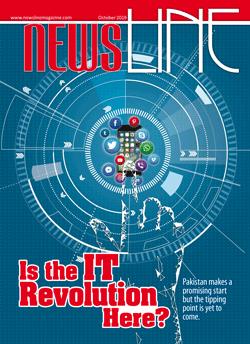Editor’s Note: October 2019
By Rehana Hakim | Editor's Note | Published 6 years ago
 Did the Pakistani Prime Minister’s passionate speech on the grim situation in the Kashmir Valley resonate with the 193 member states of the UN — or just with the audience back home? Was it a game-changer — or just another speech by another head of state?
Did the Pakistani Prime Minister’s passionate speech on the grim situation in the Kashmir Valley resonate with the 193 member states of the UN — or just with the audience back home? Was it a game-changer — or just another speech by another head of state?
While he addressed issues of Islamophobia, climate change and the West’s complicity in money laundering in developing countries, the primary thrust of Prime Minister Imran Khan’s 55-minute hard-hitting speech before the 74th UN General Assembly focused primarily on the human rights violations in the valley, the disappearance and torture of young Kashmiri males (13,000 at last count), the rape of women, and the lockdown that had made life a living hell for all Kashmiris. He warned of the dangers the situation posed for the two nuclear-armed countries – and the world at large.
Imran Khan was only reiterating what the international print media and assorted TV networks (among them the BBC, CNN, The Wall Street Journal and The Washington Post ) have reported. Further, there are damning reports from human rights groups in India, and scathing denunciations by Indian luminaries like Amartya San and Arundhati Roy.
Among those who spoke in favour of Imran’s standpoint on Kashmir and demanded that the Kashmiris be allowed the right of self-determination were China, Turkey and Malaysia. The Arab world meanwhile, yet again, failed to call for the restitution of justice in the Muslim world. Little wonder then that Palestine remains a festering wound in the heart of the Muslim world, Yemen continues to bleed, and if the sound of silence is all that emanates from the ‘ummah,’ so too will Kashmir.
After his offer to Imran Khan to mediate between India and Pakistan on the Kashmir issue, US President Donald Trump asked the two to resolve their differences bilaterally. Mr Trump seemed to have had a change of heart after attending the Indian diaspora’s mega community summit, “Howdy, Modi!” in Houston.
And understandably – but not justifiably – so. The Indian diaspora boasts a sizeable vote bank, has managed to acquire key posts and considerable clout in the US over the years and is using that clout effectively to further its own interests.
To further stymie Pakistan’s efforts to draw the world’s attention to Kashmir, the events unfolding in Washington DC, as Trump battles what he refers to as an ‘impeachment coup’ by the Democrats, are likely to push it off the radar.
Pakistan’s efforts to get the US-Taliban peace talks on Afghanistan to move forward also seem to be coming to naught. With one curt tweet, Trump pulled out of the talks. And if Pakistan was hoping to improve its stock by mediating between the US, Saudi Arabia and Iran, that too seems to have been put on hold.
Meanwhile, the Prime Minister’s own battles on home ground are far from over. Punjab, under Buzdar, is in political turmoil. Sindh is up in arms over PTI’s failed attempts to remote control Karachi from Islamabad. Balochistan and Khyber Pakhtunkhwa are still in the grip of violence. And, above all, the economy presents an increasingly abysmal picture. For the first time, assorted captains of local industry are publicly declaring their distress about the current economic situation, on the air and from any platform they can. And then there’s Maulana Fazlur Rehman gearing up for a ‘Million-Man March’ to unseat the government. But while his political nemeses – the Sharifs and the Zardaris – have agreed in principle to participate in the march, they are still not clear when they will be ready to do so.
Clearly the euphoria after Imran Khan’s UN speech has dissipated, as the business of state demands urgent redressal.
Rehana Hakim is one of the core team of journalists that helped start Newsline. She has been the editor-in-chief since 1996.
No more posts to load


